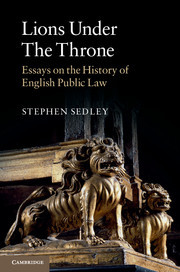Description
Lions under the Throne
Essays on the History of English Public Law
Author: Sedley Stephen
A series of studies of the historical origins and development of modern English public law.
Language: English
Subject for Lions under the Throne:
Approximative price 77.29 €
In Print (Delivery period: 14 days).
Add to cart
Lions under the Throne
Publication date: 09-2015
250 p. · 15.7x23.5 cm · Hardback
Publication date: 09-2015
250 p. · 15.7x23.5 cm · Hardback
Approximative price 41.42 €
In Print (Delivery period: 14 days).
Add to cart
Lions under the Throne
Publication date: 09-2015
306 p. · 15.2x22.9 cm · Paperback
Publication date: 09-2015
306 p. · 15.2x22.9 cm · Paperback
Description
/li>Contents
/li>Biography
/li>
Francis Bacon wrote in 1625 that judges must be lions, but lions under the throne. From that day to this, the tension within the state between parliamentary, judicial and executive power has remained unresolved. Lions under the Throne is the first systematic account of the origins and development of the great body of public law by which the state, both institutionally and in relation to the individual, is governed.
Introduction; Part I. Histories: 1. Lions in winter: public law in the twentieth century; 2. The dark satanic mills: the Victorian state; 3. New corn from old fields: the Hanoverian harvest; 4. Parchment in the fire: public law in the Interregnum; 5. The future of public law; Part II. Themes: 6. The royal prerogative; 7. The sovereignty of Parliament and the abuse of power; 8. The right to be heard; 9. The separation of powers; 10. Public law and human rights; 11. The state and the law; 12. Standing and 'sitting'; 13. Law without courts: the tribunal system; 14. The rule of law.
Stephen Sedley practised at the English bar from 1964 to 1992 before serving as a judge of the Queen's Bench division of the High Court from 1992 to 1999 and as a Lord Justice of Appeal from 1999 to 2011. He has also sat as a judge ad hoc of the European Court of Human Rights and the Judicial Committee of the Privy Council. Over time, he specialised increasingly in the developing field of public law, and in his current role as visiting professor at the University of Oxford has prepared and delivered the series of lectures which form the basis of this book.
© 2024 LAVOISIER S.A.S.

